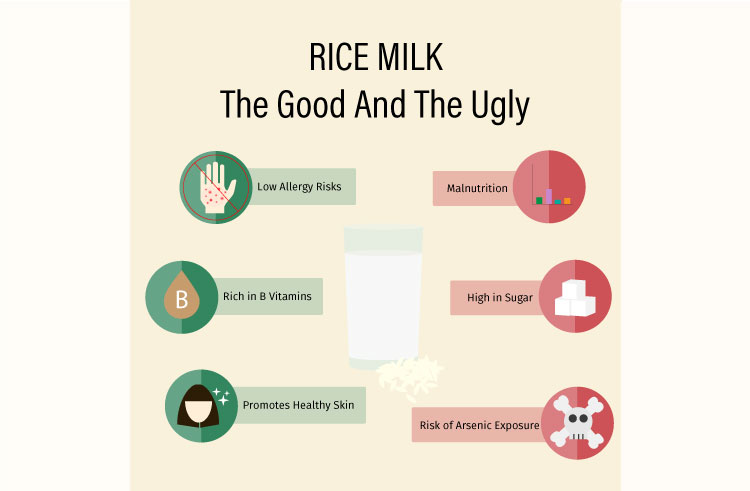Nutrition
Per 100 ml of plain, natural, unfortified rice milk
Energy 47 kcal
Fat - 1 g.
Proteins - 0.3 g.
Carbohydrate - 9 g.
Sugars- 5 g.
Fiber - 0.3 g.
Vitamins - Vitamin A 4%, Vitamin B-12 10%, Vitamin D 10%
Minerals - Calcium 11%, Iron 1%, Magnesium 2%
Benefits
Low Allergy Risks
For people who has lactose intolerance, soy or nut allergies, rice milk seem to be a good choice. In fact, rice is one of the most hypoallergenic food along with other grains like quinoa which mean it is very less likely to cause allergy. However, a study has identify some allergic reaction to rice, but this quite rare and can be weakened by cooking process.
Rich in B Vitamins
Rice milk especially brown rice milk contains most of the B vitamins (except for vitamin B12) such as Thiamin and Niacin. Thiamin or vitamin B1 is known to help maintain healthy metabolism, providing energy and keep you in a good mood. Niacin or B3 is know to maintain healthy heart and brain function. Other B vitamins found in rice products are vitamin B2 and B6 which helps maintain the energy level from food and boost metabolism.
Promotes Healthy Skin
Rice contains antioxidants that helps slow down the aging process of the skin and provide anti-inflammatory agent for skin. Inositol and para-aminobenzoic are the two components found in rice which promotes blood circulation, prevent skin from aging and keep the skin looks healthy. In many Asian countries even bath themselves in rice milk for soft and healthy skin!
Side Effects
Malnutrition
Rice milk is low in calcium, proteins and other vitamins and is very high in carbohydrate. Children who rely on rice milk has lower growth rate than on other milk, and can cause lack of nutrients in adults. Though, manufactured rice milk are fortified with calcium and vitamin d, it also comes with additives such as carrageenan.
High in Sugar
Rice milk is not really diabetic-friendly as the milk mainly comprise of carbohydrates and natural sugar. It is taste nice and naturally sweet, but it wouldn’t keep you full for long. Rice milk may actually make you feel hungry faster as it spikes up insulin level in your blood stream.
Risk of Arsenic Exposure
Rice milk and other rice products are know to contain inorganic arsenic more than other food. There are side effects of long-term and heavy consumption of arsenic which are lung, bladder and skin cancer. However, the amount of arsenic in rice milk is not harmful to adult. It is suggested strongly to be kept away from infant and young children and is not suitable for mother who is breastfeeding the infant. Studies found the effect of arsenic on young children weakening their immune system and neurodevelopment.
Final Thoughts
Rice milk is one of the least allergenic milk which is consider to be really comforting and light. Lots of B vitamins are found in rice milk especially brown rice type giving the body more energy. As well as antioxidants that promotes blood circulation and keep the skin healthy, people in the ancient even bath in rice milk for healthy skin! The disadvantages of rice milk are that it has less nutrient and the calories mostly comes from carbohydrate. The industrial process also expose arsenic into rice which is a really harmful substance when consume in large amount. Buying organic rice milk can help reduce the exposure to arsenic.

